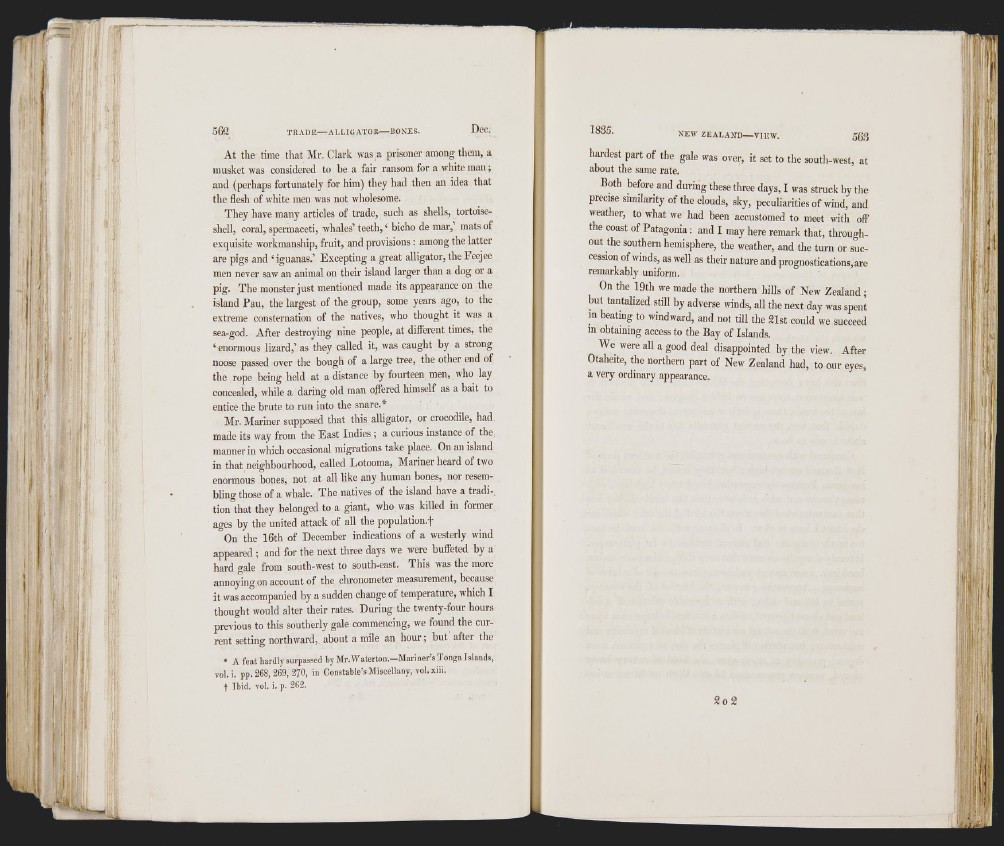
,1 Mil
I
|l -
5G2 TRADE ALLIGATOR RONES.
At the time that Mr. Clark was a prisoner among them, a
musket was considered to be a fair ransom for a white man;
and (perhaps fortunately for him) they had then an idea that
the flesh of white men was not wholesome.
They have many articles of trade, such as shells, tortoiseshell,
coral, spermaceti, whales’ teeth, ‘ bicho de mar,’ mats of
exquisite workmanship, fruit, and provisions : among the latter
are pigs and ‘ iguanas.’ Excepting a great alligator, the Feejee
men never saw an animal on their island larger than a dog or a
pig. The monster just mentioned made its appearance on the
island Pan, the largest of the group, some years ago, to the
extreme consternation of the natives, who thought it was a
sea-god. After destroying nine people, at different times, the
‘enormous lizard,’ as they called it, was caught by a strong
noose passed over the bough of a large tree, the other end of
the rope being held at a distance by fourteen men, who lay
concealed, while a daring old man offered himself as a bait to
entice the brute to run into the snare.*
Mr. Mariner supposed that this alligator, or crocodile, had
made its way from the East Indies ; a curious instance of the
manner in which occasional migrations take place. On an island
in that neighbourhood, called Lotooma, Mariner heard of two
enormous bones, not at all like any human bones, nor resembling
those of a whale. The natives of the island have a tradi-,
tionkhat they belonged to a giant, who was killed in former
ages by the united attack of all the population.#
On the 16th of December indications of a westerly wind
appeared ; and for the next three days we were buffeted by a
hard gale from south-west to south-east. This was the more
annoying on account of the chronometer measurement, because
it was accompanied by a sudden change of temperature, which I
thought would alter their rates. During the twenty-four hours
previous to this southerly gale commencing, we found the current
setting northward, about a mile an hour; but after the
• A feat hardly surpassed by Mr.Watertoi).—Mariner’sTongalslands,
vol.i. pp. 268, 269, 270, in Constable’s Miscellany, vol. xiii.
t Ibid. vol. i. p. 262.
hardest part of the gale was over, it set to the south-west, at
about the same rate.
Both before and during these three days, I was struck by the
precise similarity of the clouds, sky, peculiarities of wind, and
weather, to what we had been accustomed to meet with off
t e coast of Patagonia: and I may here remark that, throughout
the southern hemisphere, the weather, and the turn or succession
of winds, as well as their nature and prognostications, are
remarkably uniform.
On the 19th we made the northern hills of New Zealand ;
but tantalized still by adverse winds, all the next day was spent
m beating to windward, and not till the Slst could we succeed
m obtaining access to the Bay of Islands.
We were all a good deal disappointed by the view. After
Otaheite, the northern part of New Zealand had, to our eyes,
a very ordinary appearanceijf
|:
:iJ|a
■ If ,1’ ill'
:
1 !.
1M! 1
ifil